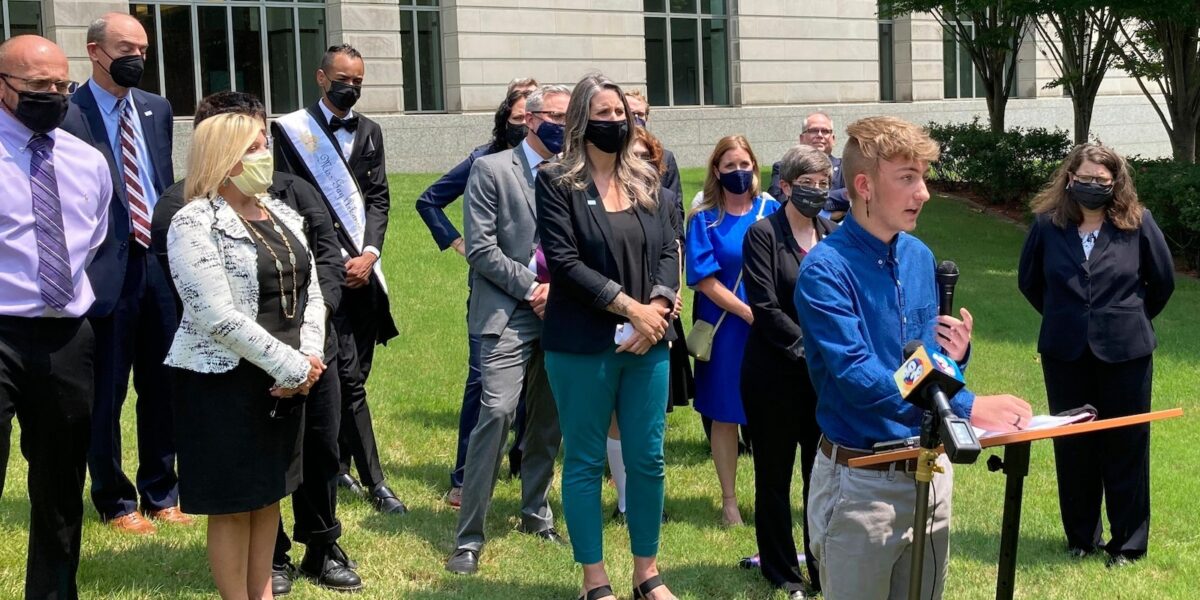LITTLE ROCK, Ark. — A federal appeals court will hear arguments Thursday over Arkansas’ first-in-the-nation ban on gender-affirming care for minors, as the fight over the restrictions on transgender youths adopted by two dozen states moves closer to the U.S. Supreme Court.
Arkansas is appealing a federal judge’s ruling last year that struck down the state’s ban as unconstitutional, the first decision to overturn such a prohibition. The 2021 law would prohibit doctors from providing gender-affirming hormone treatment, puberty blockers or surgery to anyone under 18.
The case is going before the full 8th U.S. Circuit Court of Appeals rather than a three-judge panel after it granted a request by Republican Attorney General Tim Griffin. The move could speed up the case’s march toward the U.S. Supreme Court, which has been asked to block similar laws in Kentucky and Tennessee.
It’s unclear when the 8th Circuit will make a ruling, though one is unlikely to come immediately.
At least 24 states have adopted laws restricting or banning gender-affirming medical care for transgender minors, and most of those face lawsuits. Judges’ orders are in place temporarily blocking enforcement of the bans in Idaho and Montana. The restrictions on health care are part of a larger backlash against transgender rights, touching on everything from bathroom access to participation in sports.
U.S. District Judge Jay Moody last year ruled that Arkansas’ health care restrictions violated the due process and equal protection rights of transgender youths and families. He also ruled that it violated the First Amendment by prohibiting doctors from referring patients elsewhere for such care. Moody had temporarily blocked the law before it could take effect in 2021.
The American Civil Liberties Union is representing the families of four transgender youths and two providers. In court filings, the ACLU called the ban a “waking nightmare” that has prompted their clients to look at moving outside Arkansas to receive the care. The court will also hear arguments from an attorney for the Justice Department, which has also opposed the Arkansas ban.
“Despite the overwhelming evidence and expert testimony affirming the safety and effectiveness of gender-affirming care for trans youth, we find ourselves once again fighting for the basic right to access this life-saving treatment without unnecessary government interference,” Donnie Ray Saxton, the father of Parker, one of the youths challenging the ban, said in a statement released by the ACLU.
Multiple medical groups, including the American Medical Association and the American Academy of Pediatrics, have opposed Arkansas’ ban and urged the 8th Circuit to uphold the decision against it.
The state has pointed to appeals court rulings allowing Alabama, Kentucky and Tennessee’s bans to be enforced. Arkansas’ attorneys have called the care “experimental,” a description that Moody’s ruling said was refuted by decades of clinical experience and scientific research.
“The district court invented a novel new constitutional right for parents to subject their children to any sort of procedure a practitioner recommends, no matter whether the State has determined that the procedure is experimental and unsafe,” the state said in a filing late last year. “No such right exists, and the district court’s contrary conclusion should be reversed.”
Arkansas’ ban was enacted after the majority-GOP Legislature overrode a veto by Asa Hutchinson, the Republican governor at the time. Current Gov. Sarah Huckabee Sanders, Hutchinson’s successor and also a Republican, has said she would have approved the ban and last year signed legislation making it easier to sue providers of such care for malpractice.


